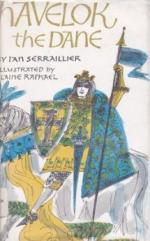“Men know me,” said I, “but that cannot be helped.”
He laughed gaily at that.
“Why, here we speak as if one man in a hundred knew you. And after all it may be that we shall get a place that none need be ashamed of. Look, here comes a mighty fine lord from the gateway.”
It was Berthun the steward, for whom we were waiting, and I knew him well by sight. Often had he bought our fish, but I did not think that he would remember me by name, if he had ever heard it. He was a portly and well-favoured man, not old, and as he came down the street to the marketplace at the hill foot he laughed and talked with one and another of the townsfolk, whether high or low, in very pleasant wise.
Presently he stopped at a stall, and priced some meat; and when he had bought it he looked round and called for some men to carry it for him; and at that the idlers made a rush for him, tripping over one another in haste to be first, while he laughed at them.
He chose two or three, and sent them up the hill to the palace with their burdens, and then went to another booth and bought.
“This is work at which I should make a good hand,” said Havelok, laughing at the scrambling men who ran forward when the steward again called for porters. “Well paid also the job must be, to judge of their eagerness.”
The three men who had been chosen took their burden and went away, and the steward came near us, to a bakery that was close to the bridge end.
“I have a mind to do porter for once,” Havelok said. “Then I can at least earn somewhat to take back to the dame tonight.”
“If you do so,” I answered, “I will wait here for you. But you will have to fight for the place.”
Now the steward bought all that he needed, and that was bread for the whole palace for the day, and again he called for porters. Whereon Havelok got up from the bridge rail and went towards him in no great hurry, so that the idlers were in a crowd before him.
“Ho! friends,” cried Havelok, “let the good cook see all of us and make his choice. He can only take one at a time.”
“One, forsooth,” said a man from the crowd; “why, there is a load for four men there.”
“Well, then, let him pick four little ones, and give these little ones a chance of being seen.”
Now I do not think that he would have troubled with the matter any more; but whether the men knew that this was the last load that the steward had to send home, or whether they quarrelled, I cannot say, but in their eagerness to raise the two great baskets they fell to struggling over them, and the steward tried to quiet the turmoil by a free use of his staff, and there was a danger that the bread should be scattered.
“Here will be waste of what there is none too much of just now,” said Havelok; and with that he went to the aid of the steward, picking up and setting aside the men before him, and then brushing the struggling rivals into a ruefully wondering heap from about the baskets, so that he and the steward faced each other, while there fell a silence on the little crowd that had gathered. Even the men who had been put aside stayed their abuse as they saw what manner of man had come to the rescue of the baskets, and Havelok and the cook began to laugh.




